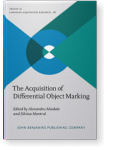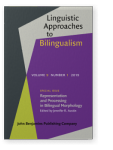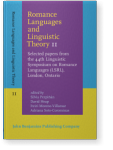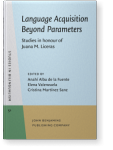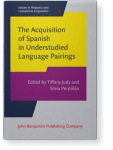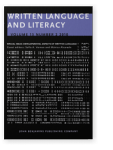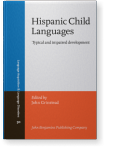Aurora Bel
List of John Benjamins publications for which Aurora Bel plays a role.
2020 Chapter 7. Animacy hierarchy effects on L2 processing of Differential Object Marking The Acquisition of Differential Object Marking, Mardale, Alexandru and Silvina Montrul (eds.), pp. 183–206 | Chapter
Studies on L2 processing of Differential Object Marking (DOM) are scant and mostly focus on the animacy of the object. We investigated the interaction of three understudied factors in L1 and L2 processing of DOM: type of animacy (human vs. non-human animal), gender and number of the object… read more
2019 Processing DOM in relative clauses: Salience and optionality in early and late bilinguals Representation and Processing in Bilingual Morphology, Austin, Jennifer R. (ed.), pp. 120–160 | Article
Early heritage bilinguals have been repeatedly found to differ from late bilinguals and from monolinguals (e.g., Montrul, 2008, 2011). In the realm of Spanish Differential Object Marking (DOM), both early heritage bilinguals (Montrul et al., 2015) and late bilinguals (e.g., Bowles & Montrul,… read more
2017 Chapter 12. The processing of intrasentential anaphoric subject pronouns in L2 Spanish Romance Languages and Linguistic Theory 11: Selected papers from the 44th Linguistic Symposium on Romance Languages (LSRL), London, Ontario, Perpiñán, Silvia, David Heap, Itziri Moreno-Villamar and Adriana Soto-Corominas (eds.), pp. 247–264 | Chapter
This paper examines whether L2 learners of Spanish can attain native-like interpretive and parsing patterns in intrasentential subject anaphor resolution, and the extent to which these patterns are modulated by L1 transfer. Adult advanced L2 learners of Spanish with different L1s (Moroccan Arabic,… read more
2016 Reference comprehension and production in bilingual Spanish: The view from null subject languages Language Acquisition Beyond Parameters: Studies in honour of Juana M. Liceras, Alba de la Fuente, Anahí, Elena Valenzuela and Cristina Martínez Sanz (eds.), pp. 37–70 | Article
Recent work suggests that bilingual speakers do not seem to behave native-like when syntax and pragmatics converge (Sorace, 2011). This study investigates subject pronouns because they allow observing how speakers integrate morphosyntactic forms with pragmatic information. Our goal is to determine… read more
2015 Subject pronouns in the L2 Spanish of Moroccan Arabic speakers: Evidence from bilingual and second language learners The Acquisition of Spanish in Understudied Language Pairings, Judy, Tiffany and Silvia Perpiñán (eds.), pp. 201–232 | Article
The goal of this study is to shed light on the conditions that regulate the interpretation of null and overt third person subject pronouns in ambiguous intra-sentential contexts in bilingual and L2 Spanish. An acceptability judgment task was administered to 26 Moroccan Arabic (MA)/Spanish… read more
2010 Anaphoric devices in written and spoken narrative discourse: Data from Catalan Developmental aspects of written language, Vernon Carter, Sofía A. and Mónica Alvarado (eds.), pp. 236–259 | Article
In this study, we focus on pronominal anaphora and we investigate the referential properties of null and overt subject pronouns in Catalan, in the semi-spontaneous production of narrative spoken and written texts by three groups of speakers/writers (9–10, 12–13, and 15–16 year olds). We aimed at… read more
2009 Person and number asymmetries in child Catalan and Spanish Hispanic Child Languages: Typical and impaired development, Grinstead, John (ed.), pp. 195–214 | Article
This study provides a unified account for the different Number Agreement patterns attested in early Catalan and Spanish. The scarce Person Agreement errors analyzed indicate the existence of a pragmatic rather than a syntactic deficit while, concerning Number, the distribution of plural subjects… read more
